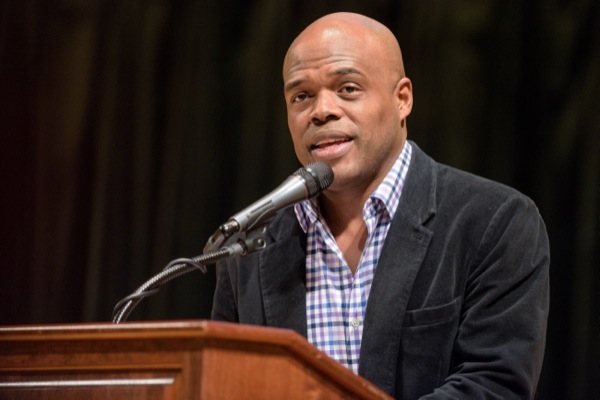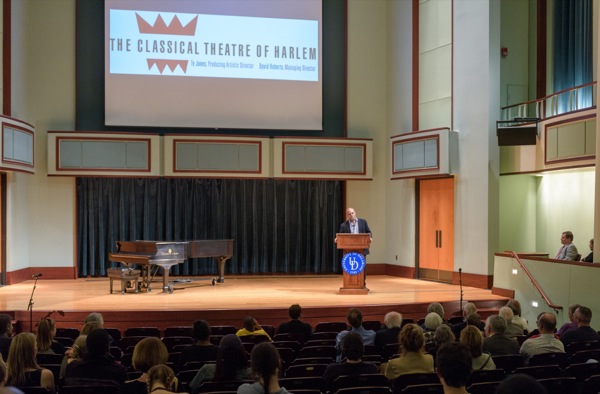


'The Myth of The Superlative'
UD alumnus Ty Jones discusses race, racism and Monopoly at Paul R. Jones lecture
4:03 p.m., March 11, 2016--When conducting research in preparation for presenting the Paul R. Jones lecture, Ty Jones discovered a few quotes that hit home about the University of Delaware benefactor in whose honor the lecture series is named.
One that stood out stated that Paul R. Jones had been denied admission to law school because of his race. “That quote stopped me in my tracks,” said Jones. “I submit that he being denied admission had nothing to do with race. It was racism.”
People Stories
'Resilience Engineering'
Reviresco June run
Jones, producing artistic director of the Classical Theatre of Harlem and a UD alumnus, shared his thoughts during his talk “The Myth of the Superlative” at the annual Paul R. Jones lecture on March 10 in UD's Roselle Center for the Arts.
During the lecture, Jones said, “There was nothing wrong with [Paul Jones] or his race that was the cause of him not being admitted. Rather, there was an institution that was deliberately devised, deliberately constructed and deliberately maintained by a consensus of people whose inferiority complex — masked as supremacy — consciously endorsed the plunder, the theft, the heist of a people whose melanin is more expressed than his neighbor.”
At the outset of the lecture, Jones described his talk as a letter of sorts to his three children, ages 5, 7 and 9, who were in the audience with his wife. He stressed the importance of having open, frank discussions with children, especially those around his own children’s ages, because he feels that is the time when children can begin to hate.
“I will not likely ever understand the psyche of a person who justifies that their destiny is to be realized at the expense of another human being, erects symbols that manifest that exploitation, and then declares that their ascension is superlative,” he said.
But Jones said he was encouraged by the efforts of people and institutions, like the University of Delaware, to develop diversity plans that address the need to do more to facilitate change. “We continue to do the difficult job of unplugging ourselves from the myths of these superlatives we have internalized over the centuries,” he said.
Jones, who received a bachelor’s degree in communication from UD in 1992 and a master of fine arts degree in theatre through UD's Professional Theatre Training Program in 1995, has been with the Classical Theatre of Harlem since 2003. During that time, he has served as actor, producer, managing director, development director and board chair.
Under his leadership, the theatre’s artistic programming has grown both in scope and in recognition.
His approachable personality puts him in positions where well meaning people feel comfortable speaking their mind. They will tell Jones they are not responsible for what happened in our nation’s past and they question why we as a society can’t "just get over it." Jones explained our country’s difficult history with an analogy to a popular board game.
“I say it’s somewhat like a game of Monopoly,” he said. “And those with whom you are playing have all the property, have all the money. They get to make the rules and not only do you have to play this game, but you have to play it naked. You have to come to the game with nothing. And you have to play this game for over 350 years. And the only person who accumulates wealth over those 15-plus generations is the person with whom you’re playing. And along those three and a half centuries, they were able to name streets, buildings, municipalities, counties, states as a constant reminder, unwittingly or not, of the myth of their supremacy.”
He continued, “And in spite of these vile despicable rules and declarations, though you came to the game with nothing, you persevered to acquire Boardwalk and Park Place and put some property on it. Only to have it taken away, not only through violence, but also through policy.”
Jones encouraged the audience to be ever vigilant in fighting racism. “The best way to combat the legacy of racism is through multiple fronts, because racism is a cancer,” he said. “Doctors talk about cancer as being intelligent, that it can hide out. That it can keep itself from being detected. Well, racism does the same thing. It shifts and it changes. And sometimes it is very, very difficult to recognize.”
His advice? “You can be like Paul Jones and play the long game,” he said. “Paul Jones had the presence of mind when he gifted his work to insist on using it to assert how the art intersects with anthropology, how it intersects with science, how it intersects with social justice, with literature.”
There are elements of drama in all that we do in fighting racism and its lasting impact, he said. But, perhaps there are more elements from the stage in our history than our future.
“The achievement of black Americans is truly extraordinary,” said Jones. “To create something from nothing—there is nothing more theatrical than that.”
Interviews with Jones by STN student television representatives can be found on the Paul R. Jones Initiative website.
About Ty Jones
During his tenure with the Classical Theater of Harlem, Jones initiated the acclaimed Uptown Meets Downtown program and led the inaugural Uptown Shakespeare in the Park project, bringing free outdoor professional theatre to Harlem’s Marcus Garvey Park.
Jones made his Broadway debut in Judgment at Nuremberg, and was also seen in the Tony Award-winning production of Henry IV and Julius Caesar with Denzel Washington.
He won an Obie Award for his portrayal of Archibald in the revival of the critically acclaimed Off-Broadway production The Blacks: A Clown Show.
As a writer, Jones’ play, Emancipation: Chronicles of the Nat Turner Rebellion, premiered for the Classical Theatre of Harlem. He first created Emancipation as a screenplay, and it was selected as a finalist in the Sundance Institute Feature Film Program, was endorsed by the Southern Poverty Law Center, received Honorable Merit from the Writer Digest Screenwriters Association and won the San Francisco Black Film Festival Screenwriting Competition.
Jones was presented a UD Presidential Citation for Outstanding Achievement in 2002.
About the Paul R. Jones Initiative
The Paul R. Jones Initiative fosters educational inquiry, interdisciplinary engagement, and critical thinking with and through African American art at the University of Delaware.
Founded in conjunction with the gift of the Paul R. Jones Collection, housed in Mechanical Hall, the initiative supports a broad range of programming intended to strengthen the collection and its interconnectivity with campus life and community.
The Paul R. Jones Annual Lecture honors the late Paul. R. Jones and his gift of African American art to the University in 2001. Since its arrival on campus, UD has supported a wide range of research and curricular programming using African American art as the seminal point of departure. This includes American art and culture in dialogue with Africa and its diaspora.
Mr. Jones, who received an honorary doctor of letters degree from UD in 2004, died in 2010.
Article by Skip Cook
Photos by Evan Krape









